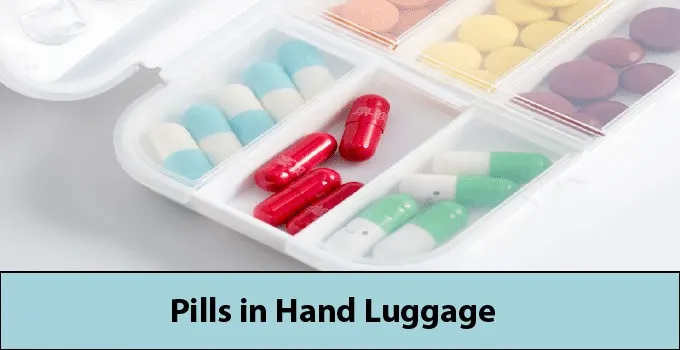Whether and under what conditions medicines may be transported on board the aircraft is, of course, an important question. Many people are dependent on their medication and therefore do not want to take unnecessary risks when travelling. It is well known that there are special rules for liquid medicines carried in carry-on luggage. But what about medications in solid form? In the following, we want to deal in particular with the topic of pills in carry-on luggage.
Can I carry pills in my carry-on luggage?
It is generally permitted to carry pills in hand luggage. If you travel with extensive medication and/or carry prescription drugs and pills, it is recommended that you obtain a medical certificate. This medical certificate should confirm in particular that these are medicines for personal use and provide an overview of which medicines you need and how much of them. If necessary, you must present this medical certificate at the security checkpoint or at customs. However, the probability that the security forces will want to see such a certificate from you is very low.
Does it even make sense to carry pills in hand luggage?
Absolutely. Otherwise, the only alternative is transporting it in your checked baggage. And as is well known, it is no secret that it happens now and then that checked baggage gets lost or arrives late on the journey. And then you’re at your destination without your medication.
Of course, this must be prevented at all costs! And to make matters worse, some of your medicines may not even be available at your destination. And if they are prescription drugs, then you have a real problem.
How many pills/tablets should you take with you on the trip?
If you need to take your medication in tablet form regularly, it is recommended that you carry approximately one and a half to two times the normal requirement in your hand luggage, as flights may be diverted or departure of your aircraft may be delayed for some reason. Then you are well prepared for such cases.
What airlines say about transporting pills in hand luggage
Unfortunately, there is not much to report here. The vast majority of airlines speak only indirectly about pills by talking about medicines in general. And for drugs in general, the central question to be asked is always: are these drugs in liquid or solid form?
And since pills are of course solid dosage forms, there are usually no problems at the security checkpoint, as there are no specific restrictions, such as for liquids in hand luggage.
At least, we could find some information at British Airways. They are indeed stating that tablets and capsules are allowed in both hand luggage and in checked luggage.
What airports say about pills in hand luggage
London Heathrow:
This is what London Heathrow says about the question: Can I carry tablets and pills in my hand luggage?
Dublin Airport:
There is no mention of tablets and capsules at the Dublin Airport Security FAQ. That is a good sign, we would say.
Vienna Airport:
In the document “What can I take on board” you will find the following statement:
Airport Graz:
At Graz Airport we find exactly the same information as at Vienna International Airport. In their PDF with the name “What may I take on board, what is forbidden?
Salzburg Airport:
At Salzburg airport, we also find information on the transport of tablets in solid form. That’s interesting. It is therefore clear that at least the airports in Austria have no problems with the transport of tablets in hand luggage.
Conclusion: Pills in carry-on luggage
From personal experience, I can say that the transport of pills in hand luggage is generally unproblematic. Until now I had pills in my hand luggage with me on every trip and never had to show them separately, let alone leave them at the security checkpoint. Among them were always a few prescription drugs.
By the way, I never had to show a medical certificate for this until then. However, if you have a large number of medicines and pills with you, customs staff may become suspicious. That is why I would like you to take into consideration to fill out the ADAC medical certificate (see next paragraph).
ADAC drug form for pills and other drugs
If you encounter problems with your pills and/or other medication at customs, it can be helpful if you have primarily completed a medication form which certifies which medication and how much of it you need (must be for personal use!). You can also use this form to list materials that you need for medical purposes.
The certificate is in 4 languages: German, French, English and Spanish. This ensures that security personnel understand your certificate virtually anywhere in the world. After all, not everyone speaks German.
According to ADAC, customs regulations for medicines are particularly strict in the following countries:
- Singapore
- Saudi Arabia
- United Arab Emirates
The ADAC also confirms that the form should be signed and stamped by the doctor.
Here you can download the medication form directly: ADAC drug form.
Related Questions
Do pills need to be in prescription bottles when flying? In Europe, this will not be necessary. Moreover, as far as pills go, you will hardly ever have to present a prescription for pills in your hand luggage at all. In the US, the TSA is responsible for these kinds of questions. Generally speaking, pills in hand luggage in the US are fine too, also if not in the prescription bottle. However, different states have different rules in the US, so please better double-check this.

Hey guys! It’s me, Marcel. I am the proud owner of carry-on-baggage.com. I am dealing with hand luggage related issues on a daily basis and I own several websites in this niche. Travelling is one of my biggest passions in life and I, therefore, happen to know a thing or two about hand luggage. I hope you all have a safe trip! Take care and thanks for the support. I really appreciate it.
